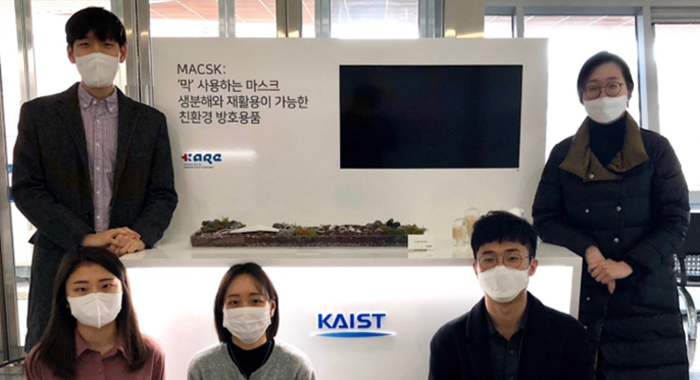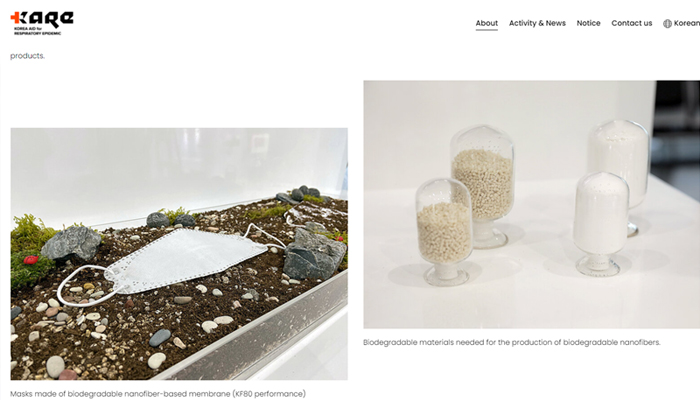SMART CITY
SMART INNOVATION
WEBZINE2022 Vol.05, No.1
All about Lab
KAIST Waste-Innovating Technologies for Humanity Laboratory (WITHLAB)
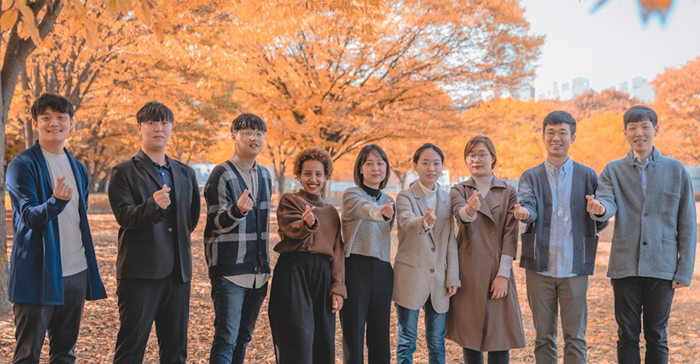
Smart Water and Waste Infrastructure for Environmental Sustainability
-
- WITHLAB is a group of experimentalists dedicated to solving problems at the interface of water, energy, and materials sustainability. The tool we use is environmental chemical and biological technology. Applications of our work include sustainable wastewater treatment, renewable energy/materials, and integrated waste management.
-
-
KAIST WITHLAB’s research are focusing on sustainable water and infrastructure. For instance, we study 1) waste-derived, biodegradable, bio-based, and bio-compatible plastics, 2) plastic waste valorization and 3) resources recovery from agricultural waste.
The current research topics include:
-
KAIST WITHLAB’s research are focusing on sustainable water and infrastructure. For instance, we study 1) waste-derived, biodegradable, bio-based, and bio-compatible plastics, 2) plastic waste valorization and 3) resources recovery from agricultural waste.
- 1.
Elucidating the true biodegradability of biodegradable plastics
- 2.
Microbial synthesis of polyhydroxybutyrate (PHB) by methanotrophs
- 3.
Manure derived biogas reforming towards value-added products
- 4.
Enhancement of enzymatic degradation of PET via UV pretreatment
- 5.
Wasted sawdust(biomass) derived active carbon and hydrogen capture via catalytic pyrolysis
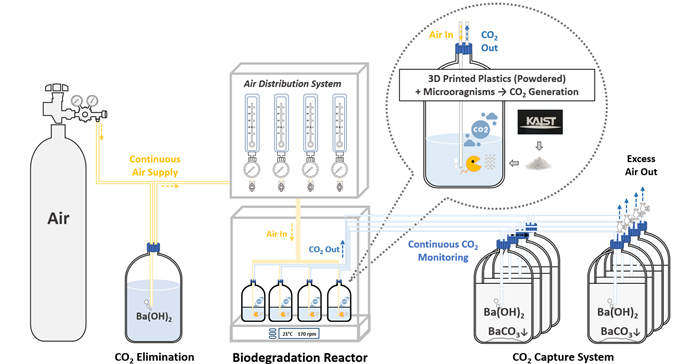
- 1) Elucidating the true biodegradability of commercial biodegradable plastics
-
- In the wake of plastic pollution increasing around the world, biodegradable plastics are one of the fastest-growing segments within the global plastics market. The biodegradation of these plastics depends on diverse factors including, but not limited to, the physicochemical structure of the materials, environmental conditions. Biodegradable polymers are only beneficial when they can actually biodegrade, but the truth is that they might not be as biodegradable as commonly believed, particularly in natural environments. We evaluate the true biodegradability of so-called biodegradable plastics and other organic wastes by simulating diverse environments, such as the controlled composting and marine environment. The current research involves the biodegradation of 3D-printed polymers and blends to assess their environmental fate.

- 2) Microbial Synthesis of Polyhydroxybutyrate (PHB) by Methanotrophs
-
- Polyhydroxyalkanoates (PHAs) are representative biodegradable biopolymers produced by various microorganisms in natural and artificial environments. Polyhydroxybutyrate (PHB) is the most common form of short-chain-length PHA, which is a promising alternative to petroleum-based non-biodegradable plastics. We aim to produce polyhydroxybutyrate (PHB) to alleviate the plastic wastes issues. From activated sludge from WWTP or leachate from landfills, we select and cultivate PHB-synthesizing bacteria that utilize methane as an energy source. These methanotrophs store carbon as a form of PHB to survive under stressful environments such as nitrogen-deficient conditions. We investigate the proper condition to produce PHB in a stable and cost-effective manner.
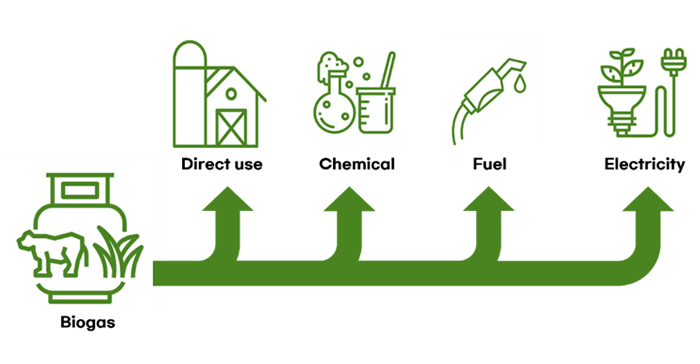
- 3) Manure derived biogas reforming towards value-added products
-
- Livestock manures derive several amounts of carbon dioxide (CO2) and methane (CH4) which are major greenhouse gases and the main concern of climate change. However, these gases are carbon-neutral and promising biogas, as they have the potential for producing various byproducts and energy. Bio-methane can be utilized as a source of fuels or electricity, while CO2 can be utilized to synthesize chemical products or for direct use. We are interested in researching profitable biogas utilization for a sustainable society.
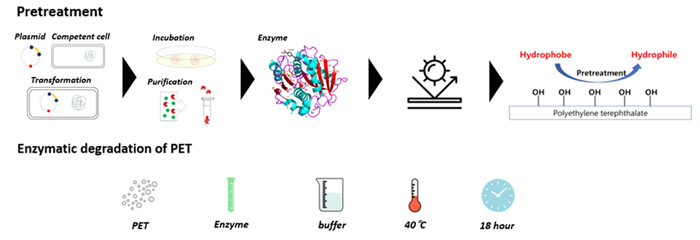
- 4) Enhancement of enzymatic degradation of PET via UV pretreatment.
-
- Poly(ethylene terephthalate) (PET) is being discarded after use throughout various areas in our modern life and it poses various environmental pollution which ends up with semipermanent risks such as marine microplastics accumulation. Ideonella sakaiensis, a newly discovered microorganism, can sequentially decompose PET into methyl hydroxyethyl terephthalate (MHET) and terephthalic acid (TPA) based on the two-enzyme system of IsPETase and MHETase. However, IsPETase, like other enzymes, also shows low degrading efficiency compared to chemical processes such as pyrolysis. We attempt to promote degradation efficiency by surface modification of PET through free radicals formed by UV light irradiation. The amount of monomer of PET (TPA & MHET) formed by enzymatic degradation increased after the pretreatment. These results would provide the possibility of overcoming the fundamental efficiency of enzymatic degradation of PET, which will provide a potential to upcycling wasted PET.
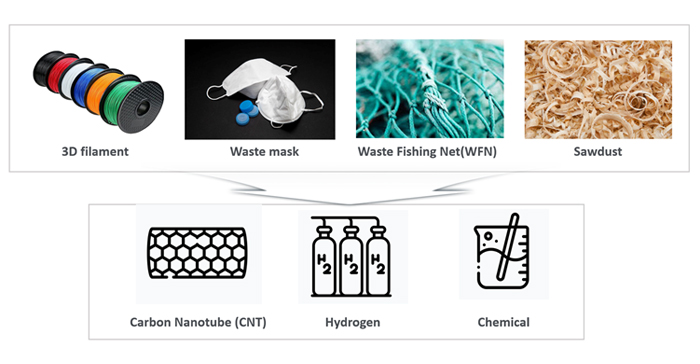
- 5) Wasted sawdust (biomass) derived active carbon and gas(H2) capture via catalytic pyrolysis
-
- We are interested in valorizing various wastes, including waste masks, used fishing nets, 3D-printing waste, sawdust through chemical processes. These wastes can persist in the natural environment due to recalcitrant to biological degradation and thus require proper management. Particularly, we are focusing on pyrolyzing sawdust and waste polyethylene terephthalate (PET) that can be recovered as an energy resource. Existing incineration systems are costly and pose environmental inefficiencies and dangers, and landfilling accompanies leachate issues. However, catalytic pyrolysis significantly increases the efficiency and reduces the cost of the conventional incineration process. In addition, This technology can be applied to deal with waste masks or medical equipment that can be a great threat to the environment due to the prevalent COVID-19.
-
- Dec 2021: Shin Hyeong Choe and Hongryeol Kim have been awarded the Outstanding Paper Award from the Korean Society of Waste Management (KSWM) Society.
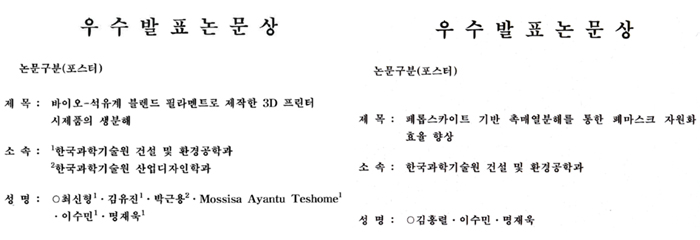
-
- Dec 2021: Yujin Kim has been selected as the recipient of the Women’s S&E Graduate Student US Visitation Program fully funded by the National Research Foundation of Korea (NRF). Yujin will join the Winkler group at the University of Washington starting Apr 2022.
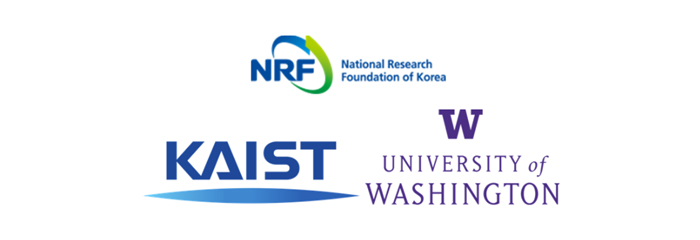
-
- Nov 2021: WITHLAB participated in 2021 Annual Meeting of the Korean Society of Environmental Engineers (KSEE).
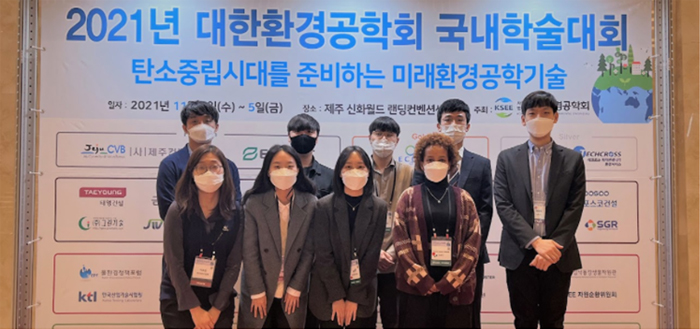
-
- May 2021: WITHLAB presented six research posters in 2021 Spring Meeting of Korean Society of Waste Management (KSWM) Society.
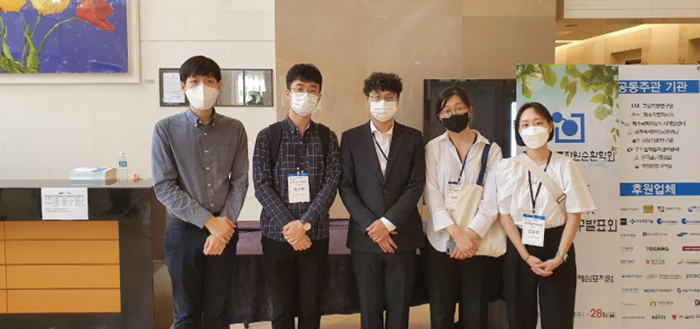
-
- Apr 2021: Jaewook Myung has been awarded the CEE Teaching Excellence Award from the Department of Civil and Environmental Engineering at KAIST.
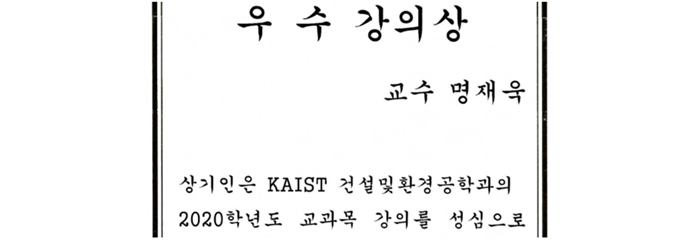
-
- Jan 2021: Jaewook Myung has been awarded the Best Reviewer Award from the Journal of Korean Society of Environmental Engineers (JKSEE).

-
- Jan 2021: WITHLAB's biodegradable single-use mask, branded as "MACSK", was featured in KAIST's Corona Response Science and Technology New Deal Project Fair.
